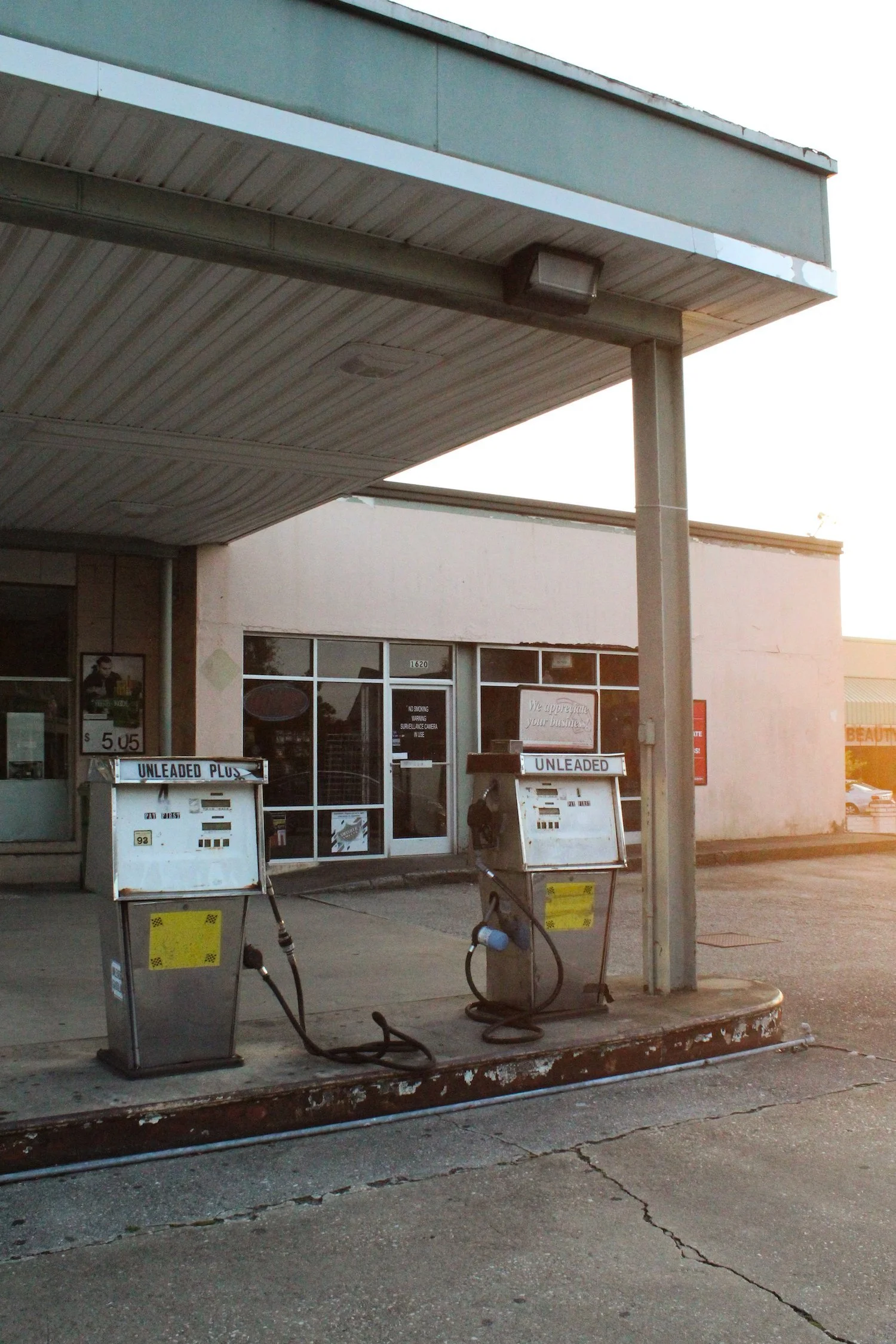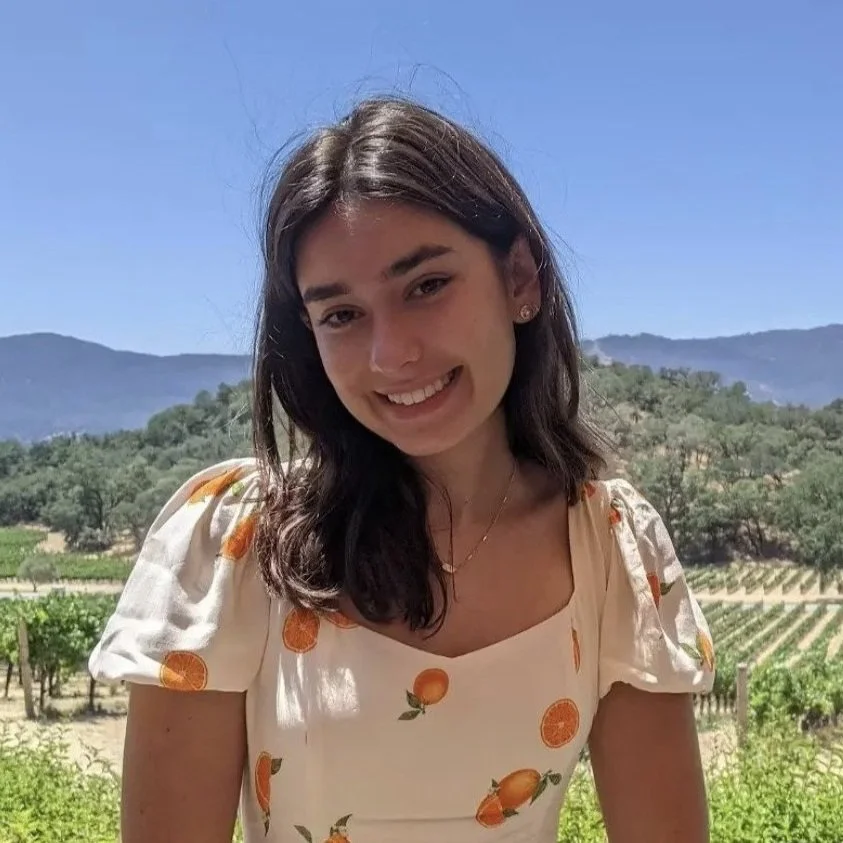Old Gas — Giada Robinson ‘24
While traveling to North Carolina, I uncovered a piece of history that has remained untouched. My family drove by an out of service gas station almost everyday without any second thought, until the day we were leaving. This place had so much character, and it needed to be revealed.
The Derby
My Sundays always begin at dawn. I keep my alarm clock under my pillow. The scratchy pillow buzzing against my head in short staccatos wakes me up, but not my dad. He sleeps in. My parents’ bedroom is next to mine, so I can’t be too loud—the walls are paper-thin. After I’ve thrown on whatever clothes are least dirty, I tiptoe to the kitchen. Today the kitchen is empty, beige-yellow tiles shining dimly in the first probing fingers of light. Weird. My mother makes a Sunday roast, and is normally up even before me. It started a year ago—my dad demanded that Sundays were days for football and food, and not for church. I duck out the side door next to the pantry. It leads right into our carport. It’s small, barely big enough to fit my mom’s car and the wall of garden tools. We’d bought them to start a small garden, but my dad had never built the garden boxes. I’m pretty sure the packets of seeds are still moldering in the back of my sock drawer. My bike leans between my mom’s blue buggy and the rake. It’s old—red paint peeling off like blisters on the skin of tourists who don’t realize that snow reflects the sun even on cloudy Kansas days. My dad scavenged it after I broke my arm in third grade. He spent the summer fixing the tires and mending the handlebars. It had been comically too big for me then, and kids used to call me “Cherry-faced Jerry” because I would turn beet red trying to power the thing up the rolling Kansas hills. Now it’s too small, and I hunch over the handlebars like a circus clown when I ride it. I’m glad to have it, though.
Our small town is bordered on all sides by dense, Old-Growth forest. The only place spared by logging, they say. A few years ago, some rich guy from Kansas City decided the woods would be a great place to build BMX bike trails. I guess he thought that people would come to podunk-nowhere if there was an attraction; it’s still podunk-nowhere, and no one bothers to drive the two hours from the nearest city. He abandoned it not long after and sold it to the city as a ‘park space.’ The city didn’t have the money to keep up the trails, so the local kids started The Derby, and now it’s a bit of a tradition. Most kids join up after church, but there’s a few of us who go to train early. The Derby is the longest of the BMX courses. No one remembers what it was originally called. I guess it was supposed to be the ‘crowning-jewel’, or whatever. We’ve turned it into The Derby. Nobody knows who really came up with the idea or quite exactly when it started. Every kid who participates sets up an ever-changing booby trap somewhere along the course. We alternate Sundays—one for setting up the traps, one for a race. Anyone can enter, but if you want to win the prize you have to hand over a dime. Whoever survives the course first wins the prize—all the dimes, normally about $1.50. It’s not a huge prize, but it’s enough to buy an icecream soda at Ponti’s, the best, and only, ice cream parlor.
Charles waits for me at the edge of the woods. He’s wearing yellow, a torch against the wheat-green of the forest. I think, that if anyone tried to describe him in one word, they would have to say yellow. Wheat-yellow hair, yellowed fingernails, turmeric-tinged skin, yellow glasses, yellow personality. His signature glasses perch at the end of his pointed nose, middle fixed with a piece of ACE tape. He always has to squint to see though the end, but he refuses to push his glasses up, possibly why they are always falling off and breaking.
“Hey! Charles, are you ready for the race?” I say, pulling my bike up next to his. He has a sweet bike—fat tires, sturdy frame, bright yellow with orange paint chipping through in some places. He and his dad painted it last summer. He’s fast as a whip on it, and the defending champion, so kids started calling him “Flaming Canary Charlie.” Kids around here like to give nicknames to the repeat racers.
“Ready to beat you, you mean?” He says, tossing his head so that his glasses don’t fall off. “I’ve been waiting here an hour. Scared to race?” I snort, pushing on his shoulder. We set off on the trail, bikes bobbing through the forest.
By the time we get to the trail head that marks the start of The Derby, kids are already starting to accumulate. They come out of different areas of the forest, seeming to multiply by the minute. Even if they don’t race, every kid who can get away comes to watch The Derby. It’s practically tradition. Everybody’s posturing now—last week I watched a documentary about peacocks in school, and this seems pretty similar. People are flashing their bikes, showing off, quite literally, the bells and whistles. I look down at my bike, more rust and pockmarks than red paint. I look up, and flush. It’s clear a few kids have already written me off. I’ve never won, but I’ve been practicing. If—when—I win, maybe my dad and I can go get icecream. We used to go every Sunday, when I was little. I would get a strawberry cone with rainbow gummy-bears dotting the surface—I know, disgusting. My dad would get plain chocolate. I would never finish mine, and my dad would wrap it up in the freezer for later.
“Hey! C’mon, gather round. Time to start The Derby!” A stick-thin kid, brown hair curling around his ears like lamb’s-fur, clambers up onto the rock in the center of the clearing. It’s Dennis, the moderator of The Derby. He was unofficially picked to be the fair, all’s-well-that-ends-well, judge. As always, he’s wearing clothes entirely unsuited for the forest—slacks, a button-down, and dress shoes. He takes his job very seriously and dresses for the part. “Raise your hand if you want to race The Derby today. Tom will take your name and your dime.” He gestures to a squat, red-faced kid at the base of the rock. The kid, not old enough to race, waddles around with an old coffee can and a sheet of paper. He barely reaches my stomach, but I dutifully hand over a dime and sign my name: Jerry Whittemore.
There’s ten of us racing today. Six boys, four girls. We line up by the tallest oak, and everybody else clears out. It’s always a mad scramble in the beginning. I brush my hair out of my eyes and survey the clearing. It’s twenty feet to the trail, a clear shot. There’s ten of us, but only enough room for two, maybe three to get on the trail. I’ll have to be fast. I look to my left, and a girl scowls back at me, green eyes narrowing. I don’t know her. She spits in the dirt. I turn away and exhale. Charles is to my right, feet planted and staring ahead calmly. I flex my hands against the handlebars. Sweat pools on my brow. I’m close to panting. I watch as Dennis raises an arm from the top of the rock.
The word “Go,” cracks like thunder in the night, and all of us are scrambling to mount our bikes and push off. Charlie, predictably, is off in a flash of yellow, kids chanting ‘Can-a-ry. Ca-na-ry.’ in the background. I fumble with the pedals. The girl is off, hot on Charles’ heels. I get my act together and push in front of a kid on a blue bike. He shouts and swerves. My shoulders brush the bushes on the side of the trail, and I immediately duck, a clump of dirt sailing past my head. Booby-trap number one. The girl wasn’t so lucky. She’s spitting out dirt as I pass her. Adrenaline races through my veins. Charles is nowhere to be seen, but if I’m smart I can catch up. My eyes race over the course, looking for the next trap. My heart pounds in my ears, a steady, drumming thump over the whooshing of my breath and the crunching of leaves under the tires. I turn the bend and a net falls on my face. I swerve wide around a pine and bat at the net. Trap number two. The path is now twisting around trees. It’s barely wide enough for my bike. My arms scrape against branches, shallow scratches itching. I pop up and over a hill, and see Charles. He’s drenched, somehow. Third trap, possibly. Hair plastered against his brow, he’s a drowned rat on a bike. Now is my chance. I pick up speed down the hill.
“Jerry! Stop! Tra—” I hear Charles distantly. I’m going too fast. My bike hits a hidden ledge of rocks and flips forward. I scream as I’m thrown to the ground. I’m tangled in my bike, the dirt, the stirred-up leaves, my thoughts. I stare into the sky, too stunned and winded to move. Three bikes zip past me: blue, green, orange, avoiding the trap. I see the blurry form of Charles standing over me. He offers a silent hand. I take it, and he pulls me to my feet. He’s looking at my bike, and I follow his look. The front wheel is dented, a roughly ‘pac-man’ shape. I stare. I can’t do anything but stare.
Charles pats me on the back and goes to pick up his own bike. Together, we stand in front of my bike—an unexpected funeral. I feel numb. Maybe some distant part of my mind is panicking—sounding the alarm. All I can feel in the overwhelming silence, and a taste like metallic, sour cherries on my tongue. Is this shock?
Charles walks me home. I stand on the sidewalk in front of my house and look back at him. He nods, once, and walks away. I look to my house, painted a quaint green, shutters and bushes, and a blue front door, and an—empty carport? My Dad’s car is gone.
It’s Sunday, so my Dad should be on the couch watching the football game. Sunday is always football day. Always. I don’t think he even missed Sunday gameday for my grandfather’s death. Mom takes her car out if anything needs to be done. I stop in the carport and lean my mangled, bloodied bike against the brick wall where all of our busted garden tools lean. I kick off my beaten down trainers by the side door and walk into the kitchen. It’s empty, dirty bowls and spatula tucked haphazardly into the small, porcelain sink. I close the door behind me, the wood grain rough on the hesitant pads of my fingers. I don’t know what is happening; my dad’s car is missing, and my mother isn’t in the kitchen preparing our weekly Sunday roast. Has armageddon come? Aliens? I can’t think of any other reason my dad would miss the game. I drift from the bright kitchen into the living room. I stop suddenly in doorway, staring, unmoored, at the wall. No dad. No TV. Dad always watches football. Did they move the TV? Did it break?
I hear crying. My mother.
I watch myself float into the master bedroom. It’s weird, being in this state. Third person point-of-view but real; so, so real. I’m a passenger in my own body. Is this shock? Where’s Dad? Where’s the TV?
I stop in the doorway of the bedroom. My mother sits on the bed, the skirt of her floral dress crumpled in her hands, cheap mascara running down her cheeks. Her flax-colored hair is bird-nested around her head, and her signature poppy-red lipstick has been rubbed off as if she has bitten her lips.
“Mother?” I say, tightening my grip on my other hand, worrying at my cuticles. I stare her in the eye when she looks up. Don’t say it. Don’t say it.
“Father is gone,” she says, “he’s not coming back.” She smooths her dress with her hands and grabs a cream-colored letter from the bed. The good stationary. Expensive. She stands and heads toward me. I’m frozen, eyes wide and locked on to hers. Hers are pink-red from crying, blue iris dulled to icy grey.
“He’s dead?” I say. Say yes. Say yes. Please. She reaches me and pries my hand open, sticking the letter in it. I mechanically grab the letter before it falls. Static rushes in my ears; there’s a pain in my heart; my head throbs in time with the pain; feeling rushes from my fingers and my toes. When did it get so cold?
“No, I said he’s gone,” she says and leaves. “Read the letter,” she throws over her shoulder. I stiffly walk to my room and curl in on myself in the bed. I open the letter, hands trembling against the paper. My dad’s looping chicken-scratch stares back at me.
Dear My Son,
The Derby — Alicia Bickel
I’ve been writing a character for a while now; Jerry. I wanted to get out of my comfort zone and write a character who was not familiar to me. I chose someone with a different gender, who lives in a different place, who has different life experiences, and who is a different age than me. In this story, I wanted to create his backstory and develop him as a younger child. His experiences in this story will help me to continue to develop him as I have been writing him: a 64-year-old retiree.



